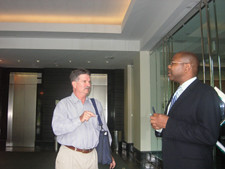Today’s Illegals ‘Not Different, Just Newer’
In 1750, Benjamin Franklin feared that German immigrants would de-Anglicize America. And 250 years later, in a nation where one in six young people under 18 are Hispanic, some politicians fear that Mexicans pose the same threat.
But one man says today’s immigrants aren’t “different, they’re just newer.”
Jason Riley, author of The Case for Open Borders, spoke at the CATO Institute on June 18 about letting more immigrants into the country. His research shows that Irish and German immigrants faced the same problems as today’s Mexicans.
“Franklin complained that German immigrants were too plentiful,” said Riley. “Franklin was one of most enlightened men of his day, [but] he lacked perspective.”
Riley said that Americans limit their perspectives and fear that new immigrants won’t assimilate. But the Irish did and “if America can assimilate the Irish, we can [assimilate] anybody.”
“The Irish were coming from a country where more than 80 percent of their country was rural…,” said Riley. “They were told they would never assimilate [into] an urban capitalist society.”
 The Irish ended up settling in the most urban areas—Boston and New York. Riley said that “supply created its own demand.”
The Irish ended up settling in the most urban areas—Boston and New York. Riley said that “supply created its own demand.”
“The Irish did jobs that were considered even too lowly for slaves. They worked in mines,” said Riley. “In 1855, 90 percent of all domestic servants were Irish. That’s a snapshot of where the Irish started.”
Riley, a member of the Wall Street Journal Editorial Board, reminded the audience that Henry Ford was the product of poor Irish immigrants. And other sons and daughters of the Irish servants are successful today, according to the U.S. Census Bureau.
“The [2000] Census showed that 31% of Irish Americans had at least a bachelor’s degree compared to 27% of Americans,” said Riley. “This history is often ignored or played down when we discuss illegal [immigrants] today.”
Riley argued that the free market and the law of supply and demand should determine how many immigrants are needed in America.
“We will reduce illegal immigration if we give people more legal ways to enter the country,” said Riley “We have the jobs. They need the work. Let them come legally and they will come legally.”
 Political analyst Michael Barone said that the elites are keeping the immigrants away.
Political analyst Michael Barone said that the elites are keeping the immigrants away.
“Our elites have been putting barriers in the way of immigration,” said Barone. “Ultimately, the good sense of the people overwhelms the nonsense of the elites.”
Some legislators are hesitant to give more visas, because they don’t want to give away jobs, Riley said.
“It’s a fallacy; there aren’t a fixed number of jobs. We have a very fluid labor market,” said Riley. “At the low end of the spectrum, where many blacks are, you do have overlap, [but] the data isn’t there to support that blacks are being pushed aside.”
Melinda Zosh is an intern at the American Journalism Center, a training program run by Accuracy in Media and Accuracy in Academia.




